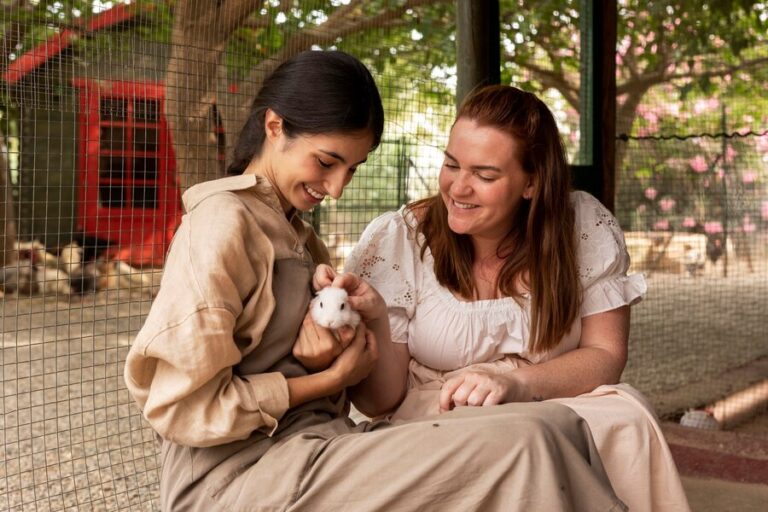Guinea pigs, also known as cavies, are small, social rodents that make great pets for people of all ages. Native to South America, these animals have a long history of domestication, dating back to the 16th century when they were first brought to Europe. Over time, guinea pigs have gained popularity as affectionate and low-maintenance pets. Understanding their basic needs and characteristics is essential before deciding to adopt one.
Guinea pigs are herbivores, thrive in groups, and require spacious, clean habitats. They communicate through a variety of vocalizations and body language, making them fun and interactive companions. This guide will provide all the necessary information to help you care for your guinea pig, ensuring a healthy and happy life.
2. Choosing the Right Guinea Pig
Before bringing a guinea pig home, it’s important to choose the right breed that suits your lifestyle. Guinea pigs come in several breeds, each with distinct fur types and personality traits. Some popular breeds include:
- Abyssinian: Known for its rosettes or swirls of fur, this breed is curious and energetic.
- American: The most common breed with short, smooth fur and a friendly demeanor.
- Peruvian: Long-haired and requires more grooming but is very gentle and social.
- Teddy: With soft, dense fur, Teddies are known for being hardy and resilient.
When selecting a guinea pig, it’s important to observe their behavior and overall health. A healthy guinea pig will have bright eyes, clean fur, and be active. You can adopt guinea pigs from pet stores, breeders, or rescue organizations. Ensure that the source is reputable and the animals are well-cared for.
3. Setting Up a Comfortable Habitat
Creating the right living environment is crucial for your guinea pig’s well-being. Guinea pigs need plenty of space to move around, so choose a cage that’s at least 7.5 square feet for one or two guinea pigs. Larger enclosures are always better.
Key elements of a guinea pig’s habitat include:
- Cage Types: Wire cages with plastic bottoms are common, but avoid cages with wire floors that can hurt their feet.
- Bedding: Opt for paper-based or aspen bedding, which is soft and absorbent. Avoid cedar or pine shavings as they can be harmful to your guinea pig’s respiratory system.
- Temperature and Lighting: Guinea pigs thrive in temperatures between 65°F and 75°F. Keep their cage out of direct sunlight and away from drafts.
- Cleaning Routine: Regularly clean the cage, remove soiled bedding, and sanitize the enclosure weekly to prevent illness.
4. Guinea Pig Diet and Nutrition
Guinea pigs have specific dietary needs to stay healthy. The foundation of their diet should consist of:
- Hay: Fresh hay, especially timothy hay, should be available at all times as it’s vital for their digestive health.
- Pellets: High-quality guinea pig pellets provide essential nutrients, but they should be limited to avoid overeating.
- Fresh Produce: Offer fresh vegetables daily, such as leafy greens, carrots, and bell peppers. Fruits can be given occasionally as treats.
- Foods to Avoid: Avoid feeding your guinea pig processed foods, onions, garlic, and iceberg lettuce, which can be harmful to their health.
- Water Supply: Provide fresh, clean water in a bottle with a sipper tube, and check it daily to ensure it’s functioning properly.
5. Handling and Socializing Your Guinea Pig
Guinea pigs are social creatures, but they can be shy at first. It’s important to handle them gently and frequently to build trust. When picking up a guinea pig, support its body with both hands and hold it close to your chest to make it feel secure.
- Socializing with Other Guinea Pigs: Guinea pigs are happiest when they have companions. Consider getting a pair of same-sex guinea pigs to prevent loneliness.
- Bonding Time: Spend time each day interacting with your guinea pig outside of its cage. Let it explore in a safe, enclosed space to strengthen your bond.
(Article continues following this structure, with headings on grooming, health care, and more.)
FAQs
- How often should I clean my guinea pig’s cage? Guinea pig cages should be cleaned weekly, with spot cleaning of bedding done daily.
- What is the best type of bedding for guinea pigs? Paper-based bedding or aspen shavings are ideal. Avoid cedar or pine, which can cause respiratory issues.
- Can guinea pigs live alone? While guinea pigs can live alone, they are social animals and generally thrive in pairs or groups.
- How long do guinea pigs live? Guinea pigs have a lifespan of 5-7 years, with proper care and a healthy environment.
- Do guinea pigs need vaccinations? Guinea pigs do not require vaccinations, but regular vet check-ups are recommended to ensure their health.
- Can guinea pigs eat fruits and vegetables every day? Yes, guinea pigs can have fresh vegetables daily, while fruits should be given in moderation.
Conclusion
Caring for a guinea pig involves providing the right environment, diet, social interaction, and regular health check-ups. By following this comprehensive guide, you can ensure your guinea pig leads a happy, healthy life.
Also Read: Overview of 200 E Business Hwy 23 Walsco TX
